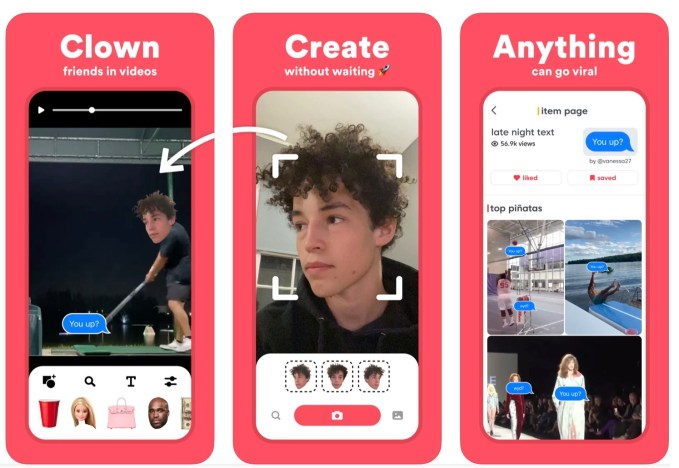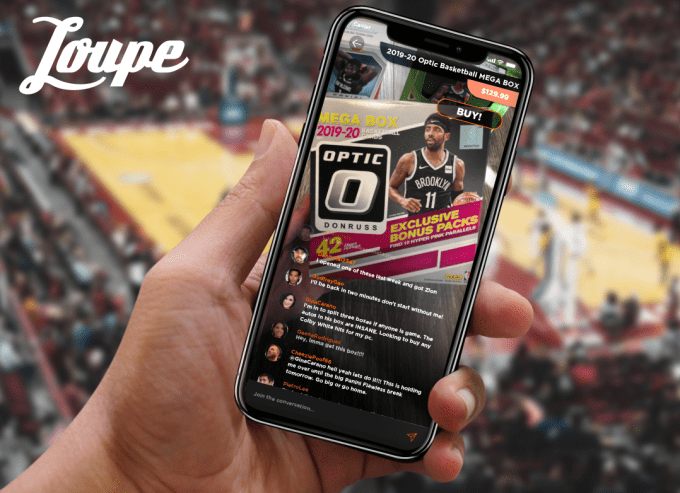News: This Week in Apps: Parler deplatformed, alt apps rise, looking back at 2020 trends
Welcome back to This Week in Apps, the weekly TechCrunch series that recaps the latest in mobile OS news, mobile applications and the overall app economy. The app industry is as hot as ever, with a record 218 billion downloads and $143 billion in global consumer spend in 2020. Consumers last year also spent 3.5 trillion minutes using
Welcome back to This Week in Apps, the weekly TechCrunch series that recaps the latest in mobile OS news, mobile applications and the overall app economy.
The app industry is as hot as ever, with a record 218 billion downloads and $143 billion in global consumer spend in 2020.
Consumers last year also spent 3.5 trillion minutes using apps on Android devices alone. And in the U.S., app usage surged ahead of the time spent watching live TV. Currently, the average American watches 3.7 hours of live TV per day, but now spends four hours per day on their mobile devices.
Apps aren’t just a way to pass idle hours — they’re also a big business. In 2019, mobile-first companies had a combined $544 billion valuation, 6.5x higher than those without a mobile focus. In 2020, investors poured $73 billion in capital into mobile companies — a figure that’s up 27% year-over-year.
Top Stories
The right-wing gets deplatformed
Last weekend, Google and Apple removed Parler from their respective app stores, the latter after first giving the app 24 hours to come up with a new moderation strategy to address the threats of violence and illegal activity taking place on the app in the wake of the Capitol riot. When Parler failed to take adequate measures, the app was pulled down.
What happened afterwards was unprecedented. All of Parler’s technology backend services providers pulled support for Parler, too, including Amazon AWS (which has led to a lawsuit), Stripe and even Okta, which Parler was only using as a free trial. Other vendors also refused to do business with the app, potentially ending its ability to operate for good.
But although Parler is down, its data lives on. Several efforts have been made to archive Parler data for posterity — and for tipping off the FBI. Gizmodo made a map using the GPS data of 70,000 Parler posts. Another effort, Y’all Qaeda, is also using location data to map videos from Parler to locations around the Capitol building.
These visualizations are possible because the data itself was quickly archived by internet archivist @donk_enby before Parler was taken down, and because Parler stored rich metadata with each user’s post. That means each user’s precise location was recorded when they uploaded their photos and videos to the app.
It’s a gold mine for investigators and a further indication of the privilege these rioters believed they had to avoid prosecution or the extent to which they were willing to throw their life away for their cause — the false reality painted for them by Trump, his allies and other outlets that repeated the “big lie” until they truly believed only a revolution could save our democracy.
The move to kick Parler offline followed the broader deplatforming of Trump, who’s accused of inciting the violence, in part by his refusal to concede and his continued lies about a “rigged election.” As a result, Trump has been deplatformed across social platforms like Twitter, Facebook, Instagram, TikTok, Twitch, YouTube, Reddit, Discord and Snapchat, while e-commerce platform Shopify kicked out Trump merch shops and PayPal refused to process transactions for some groups of Trump supporters.
Alternative social apps post gains following Capitol riot
Parler was the most high-profile app used by the Capitol rioters, but others found themselves compromised by the same crowd. Walkie-talkie app Zello, for instance, was used by some insurrectionists during the January 6 riot to communicate. Telegram, meanwhile, recently had to block dozens of hardcore hate channels that were threatening violence, including those led by Nazis (which were reported for years with no action by the company, some claim).
Now, many in the radical right are moving to new platforms outside of the mainstream. Immediately following the Capitol riot, MeWe, CloutHub and other privacy-focused rivals to big tech began topping the app stores, alongside the privacy-focused messengers Signal and Telegram. YouTube alternative Rumble also gained ground due to recent events. Right-wingers even mistakenly downloaded the wrong “Parlor” app and a local newspaper app they thought was the uncensored social network Gab. (They’re not always the brightest bulbs.)
This could soon prove to be another difficult situation for the platforms to address, as we already came across highly concerning posts distributed on MeWe, which had used extreme hate speech or threatened violence. MeWe claims it moderates its content, but its recent growth to now 15 million users may be making that difficult — especially since it’s inheriting the former Parler users, including the radical far-right. The company has not been able to properly moderate the content, which may make it the next to be gone.
2020 annual review
App Annie this week released its annual review of the mobile app industry finding (as noted above) that mobile app downloads grew by 7% year-over-year to a record 218 billion in 2020. Consumer spending also grew by 20% to also hit a new milestone of $143 billion, led by markets that included China, the United States, Japan, South Korea and the United Kingdom. Consumers spent 3.5 trillion minutes on Android devices in 2020. Meanwhile, U.S. users now spend more time in apps (four hours) than watching live TV (3.7 hours).
The full report examines other key trends across social, gaming, finance, e-commerce, video and streaming, mobile food ordering, business apps, edtech and much more. We pulled out some highlights here, such as TikTok’s chart-topping year by downloads, the rise in livestreamed and social shopping, consumers spending 40% more time streaming on mobile YoY and other key trends.
Sensor Tower also released its own annual report, which specifically explored the impact of COVID-19; the growth in business apps, led by Zoom; mobile gaming; and the slow recovery of travel apps, among other things.
Samsung reveals its new flagships

Image Credits: Samsung
Though not “apps” news per se, it’s worth making note of what’s next in the Android ecosystem of high-end devices. This week was Samsung’s Unpacked press event, where the company revealed its latest flagship devices and other products. The big news was Samsung’s three new phones and their now lower prices: the glass-backed Galaxy S21 ($799) and S21 Plus ($999), and the S21 Ultra ($1,199), which is S Pen compatible.
The now more streamlined camera systems are the key feature of the new phones, and include:
- S21 and S21 Plus: A 12-megapixel ultrawide, 12-megapixel wide and 64-megapixel telephoto with 30x space zoom.
- S21 Ultra: A 12-megapixel ultra-wide, 108-megapixel wide and, for the first time, a dual-telephoto lens system with 3x and 10x optical zoom. The Ultra also improves low-light shooting with its Bright Night sensor.
The devices support UWB and there’s a wild AI-powered photo feature that lets you tap to remove people from the background of your photos. (How well it works is TBD). Other software imaging updates allow you to pull stills from 8K shooting, better image stabilization and a new “Vlogger view” for shooting from front and back cameras as the same time.
Also launched were Samsung’s AirPods rival, the Galaxy Buds Pro, and its Tile rival, the Galaxy SmartTag.
Weekly News
Platforms: Apple
- Apple releases second iOS 14.2 developer beta. The update brings improvements to the HomePod mini handoff experience and an update to the Find My app to ready it for supporting third-party accessories.
- Apple will soon allow third-parties to join the Find My app ahead of its AirTags launch. Tile had argued before regulators last year that Apple was giving itself first-party advantage with AirTags in Find My. Apple subsequently launched the Find My Accessory Program to begin certifying third-party products. AirTags’ existence was also leaked again this week.
- Apple is working to bring its Music and Podcasts apps to the Microsoft Store.
- Apple may be working on a podcast subscription service, per The Information.
Platforms: Google
- Google appears to be working on an app hibernation feature for Android 12. The feature would hibernate unused apps to free up space.
- Google pulls several personal loan apps from the Play Store in India. The company said several of the apps had been targeting vulnerable borrowers, then abusing them and using other extreme tactics when they couldn’t pay. Critics say Google took too long to respond to the outcry, which has already prompted suicides. Police have also frozen bank accounts holding $58 million for alleged scams conducted through 30 apps, none of which had approval from India’s central bank.
Gaming

Image Credits: Sensor Tower
- 48,000 mobile games were purged from the China App Store in December 2020, reports Sensor Tower. The games removed in 2020 for not having acquired the proper Chinese gaming license, had generated nearly $3 billion in lifetime revenue.
- The top grossing mobile game in December 2020 was Honor of Kings with $258 million in player spending, up 58% year-over-year, according to Sensor Tower. PUBG Mobile was No. 2. followed by Genshin Impact.
- Among Us was the most downloaded mobile game in December 2020, per Apptopia. with an estimated 48 million new downloads in the month, most through Google Play.
- Epic Games demands Fortnite to be reinstated on the App Store, in a U.K. legal filing. The game maker is engaged in multiple lawsuits over the “Apple tax.”
Security
- Amazon’s Ring app exposed users’ home addresses. Amazon says there’s no evidence the security flaw had been exploited by anyone.
- New research details how law enforcements gets into iOS and Android smartphones and cloud backups of their data.
Privacy
- Signal’s Brian Acton says recent outrage over WhatsApp’s terms are driving installs of the private messaging app. Third-party data indicates Signal has around 20 million MAUs as of December 2020. The app also saw a surge due to the U.S. Capitol riots, with 7.5 million downloads from January 6-10.
- Telegram user base in India was up 110% in 2020. The app now has 115 million MAUs in India, which could allow it to better compete with WhatsApp.
- Privacy concerns are also driving sign-ups for encrypted email providers, ProtonMail and Tutanota. The former reports a 3x rise in recent weeks, while the latter said usage has doubled size WhatsApp released its new T&Cs.
- FTC settled with period-tracking app Flo for sharing user health data with third-party analytics and marketing services, when it had promised to keep data private. The app must now obtain user consent and will be subject to an independent review of its practices.
- FTC settled with Ever, the maker of a photo storage app that had pivoted to selling facial recognition services. The company used the photos it collected to train facial recognition algorithms. It’s been order to delete that data and all face embeddings derived from photos without user consent.
- Muslim prayer app Salaat First (Prayer Times) was found to be recording and selling user location info to a data broker. The firm collecting the data had been linked to a supply chain that involved a U.S. government contractor who worked with ICE, Customs and Border Protection, and the FBI.
- TikTok changed the privacy settings and defaults for users under 18. Children 13-15 will have private accounts by default. Other restrictions apply on features like commenting, Dueting, Stitching and more for all under 18. TikTok also partnered with Common Sense Networks to help it curate age-appropriate content for users under 13.
Government & Policy
- Italy’s data protection agency, the GPDP, said it contacted the European Data Protection Board (EDPB) to raise concerns over WhatsApp’s requirement for users to accept its updated T&Cs to continue to use the service. The law requires that users are informed of each specific use of their data and given a choice as to whether their data is processed. The new in-app notification doesn’t make the changes clear nor allow that option.
- Turkey starts an antitrust investigation into Facebook and WhatsApp. The investigation was prompted by WhatsApp’s new Terms of Service, effective February 8, which allows data sharing with Facebook.
- WhatsApp then delayed its T&C changes, as a result.
Health & Fitness
- Google this week fixed an issue with its Android Exposure Notification System that’s used by COVID-19 tracking apps. The impacted apps took longer to load and carry out their exposure checks.
Edtech
- Amazon makes an education push in India with JEE preparation app. The company launched Amazon Academy, a service that will help students in India prepare for the Joint Entrance Examinations (JEE), a government-backed entrance assessment for admission into various engineering colleges.
Funding and M&A (and IPOs)
- PayPal acquired the 30% stake it didn’t already own in China’s GoPay, making it the first foreign firm in China with full ownership of its payments business.
- Therapy app Talkspace will go public through a $1.4 billion merger with SPAC Hudson Executive Investment Corp.
- Snap acquired location data startup StreetCred. The team will join the company and work on maps and location-related products for Snapchat.
- BlaBla raised $1.5 million for its language-learning app that teaches English using TikTok-like videos. The startup, a participant in Y Combinator’s 2020 summer batch, had previously applied to YC seven times. Other investors include Amino Capital, Starling Ventures and Wayra X.
- Poshmark, the online and mobile app for reselling clothing, IPO’d and closed up more than 140% on day one.
- Dating app Bumble also filed to go public. The company claims 42 million MAUs, with 2.4 million paying users through the first nine months of 2020. It lost $117 million on $417 million in revenue during that time.
- Blog platform Medium acquired Paris-based Glose, a mobile app that lets you buy and read books on mobile devices.
- Indonesian investment app Ajaib raised $25 million Series A led by Horizons Venture and Alpha JWC. Inspired by Robinhood, the app offers low-fee stock trading and access to mutual funds.
Indonesian investment platform Ajaib gets $25 million Series A led by Horizons Venture and Alpha JWC
- Mailchimp acquired Chatitive, a B2B messaging startup that helps businesses reach customers over text messages.
- Chinese fitness app Keep raised $360 million Series F led by SoftBank Vision Fund. The six-year-old startup that allows fitness influencers to host live classes over video is now valued at $2 billion.
- Google finalized Fitbit acquisition. Google confirmed it will allow Fitbit users to continue to connect with third-party services and said the health data will be kept separate and not used for ads.
- On-demand U.K. supermarket Weezy raised $20 million Series A for its Postmates-like app that delivers groceries in as fast as 15 minutes, on average.
Downloads
Bandsintown
Exclusive performances by @AdrianneLenker, @JeffTweedy, @flyinglotus, and Fleet Foxes, coming soon to Bandsintown PLUS. https://t.co/SsnrebvOUh pic.twitter.com/81haWTPf3F
— Bandsintown (@Bandsintown) January 12, 2021
COVID has cancelled concerts, which required Bandsintown to pivot from helping people find shows to attend to a new subscription service for live music. The company this week launched Bandsintown Plus, a $9.99 per month pass that gives users access to more than 25 concerts per month. The shows offered are exclusive to the platform, and not available on other sites like YouTube, Twitch, Apple Music or Spotify.
Piñata Farms

Image Credits: Piñata Farms
This new social video app lets you put anyone or anything into an existing video to make humorous video memes. The computer vision-powered app lets you do things like crop out a head from a photo, for example, or use thousands of in-app items to add to your existing video. The resulting creations can be shared in the app, privately through messaging or out to other social platforms. Available on iOS only.
Capture App

Image Credits: Numbers Protocol
This new blockchain camera app, reviewed here on TechCrunch, uses tech commercialized by the Taiwan-based startup, Numbers Protocol. The app secures the metadata associated with photos you take on the blockchain, also allowing users to adjust privacy settings if they don’t want to share a precise location. Any subsequent changes to the photo are then traced and recorded. Use cases for the technology include journalism (plus combating fake news), as well as a way for photographers to assure their photos are attributed correctly. The app is available on the App Store and Google Play.
Marsbot for AirPods

Image Credits: Foursquare Labs, Inc.
A new experiment from Foursquare Labs, Marsbot, offers an audio guide to your city. As you walk or bike around, the app gives you running commentary about the places around you using data from Foursquare, other content providers and snippets from other app users. The app is also optimized for AirPods, making it iOS-only.
Loupe

Image Credits: Loupe
Loupe is a new app that modernizes sports card collecting. The app allows users to participate in daily box breaks, host their own livestreams with chats, collect alongside fellow collectors and purchase new sports card singles, packs and boxes when they hit the market, among other things. The app is available on iOS.




















